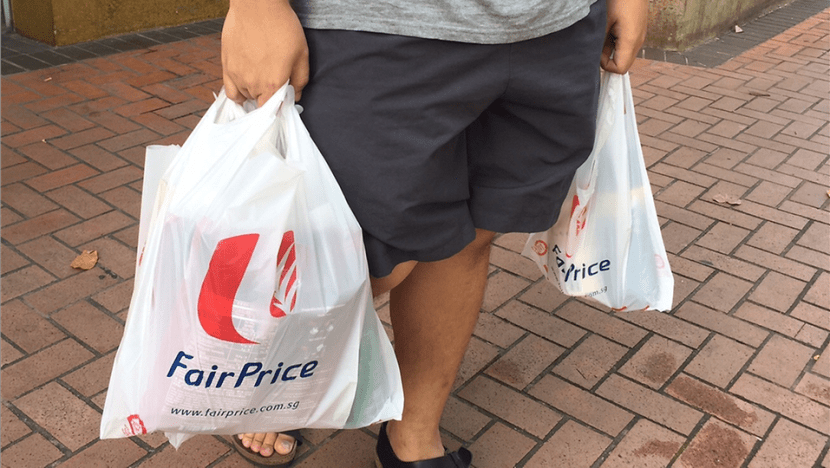Commentary: Singapore will finally charge for plastic bags. What’s next?
While the 5-cent charge is an encouraging step, plastic bags are only one of the many products that contribute to waste. Consumer behaviour must also be changed more systematically, says Sumit Agarwal of NUS Business School.

SINGAPORE: Come Jul 3, residents in Singapore will have to pay at least 5 cents for each disposable carrier bag taken from large supermarket operators. That’s one point scored for environmentalism and minus one for grumbling customers.
Truth be told, charging for plastic bags is long overdue. In 2019, NTUC FairPrice launched a month-long “no plastic bag” trial at seven outlets. Shoppers had to pay 10 cents to 20 cents per transaction for plastic bags, and the pilot was extended and grew to involve more outlets.
Nearly four years later, a government-mandated disposable carrier bag charge will apply to about 400 outlets, two-thirds of all supermarkets here.
It is encouraging that Singapore is taking more steps to cut waste. But if going green is the goal, then making plastic bags pricier may not be a strong deterrent for consumers.
I suggested in a CNA commentary in 2020 that some consumers may not be price-sensitive, and we are too entrenched in the plastic bag habit to quit. Instead, we could make it “embarrassing” for people to use plastic bags.
Much like how the graphic health warning labels of smoking are printed on cigarette packs to deter smokers, we can print images of distressed marine animals trapped in plastic waste to deter users. Grocery shoppers who do not wish to be seen with those incriminating plastic bags will make a greater effort to bring their own reusable bags.
Nevertheless, the mandatory plastic bag charge is an overdue charge for polluting the environment.
SINGLE USE, MULTIPLE CONSEQUENCES
We need to go further. The heavy usage of plastic bags is not the only culprit behind unnecessary waste. Single-use items such as food containers and straws derail Singapore’s zero waste vision, which by 2030, aims to reduce waste sent to Semakau Landfill by 30 per cent capita per day.
Yet there is little sign we are cutting down on disposable packaging. Due to COVID-19, we turned to online shopping and delivery services, and such consumption looks set to persist post-pandemic.
While shopping deliveries may occur on an ad-hoc basis, food deliveries and takeaways are more frequent. The packaging involved contributes to greater waste. And, unlike plastic bags, we can’t reuse a styrofoam box as a trash holder before discarding it.
SETTING UP CARBON SCORES
While reducing waste is an important sustainability goal, we should not neglect the greenhouse gases produced over the life cycle of packaging materials, as well as the petrol used in deliveries. Even though opting for door-to-door shipping or disposable cutlery may entail extra charges, the carbon costs incurred may not be fully covered.
Hence, we should look at nudging people away from food and shopping delivery. While users enjoy fuel and time savings when they order in, they should also pay for the carbon incurred.
Singapore will raise the carbon price from S$5 to S$80 (US$3.70 to US$60) per tonne of emissions by 2030 for top polluters - this is a top-down approach at the policy and firm level. From the ground up, individual consumers need to change their behaviour to make an impact too.
We can design and implement a carbon score for individuals. Since digital wallets record electronic payments relating to food, shopping, utilities and transport, it will be feasible to tabulate an individual’s carbon footprint based on these records.
Our way of life - how much water and electricity we consume, the transportation modes we use, and whether we buy homegrown or imported food - will have a tangible carbon score. Consumers can use this to learn about their individual emissions and what they can do to improve.
With this, we can steer individual behaviour with financial incentives. Just like how individuals gain access to varying amounts of loans based on their credit scores, they can also gain different rewards based on their computed carbon scores: For example, a lower interest rate of 20 to 30 basis points on their mortgage and auto loans or a 4 per cent cashback instead of the standard 2 per cent cashback on green credit card transactions.
BESIDES TAXING, THINK OF REWARDING
Going green need not be all about penalties. They can be about rewards. For example, if you bring your container for food takeaways, the stall owner can offer a 50-cent discount.
Merchants such as Starbucks and The Coffee Bean & Tea Leaf are already offering discounts to customers who bring their own tumblers. More merchants can adopt this policy.
Firms can also acknowledge their regular customers who go green. It can be a simple photo with the customer and amplified on social media. The action encourages the right behaviour and puts in place peer effects, which can influence other customers to go green too.
On the plastic bag charge, while it is an encouraging step, plastic bags are only one of the many products that contribute to waste. Even if we extend it to plastic containers or packaging, we are still targeting one product at a time.
We need to change people’s behaviour more systematically. Rolling out a carbon score for individuals will encourage them to adopt greener habits in more aspects of their lives. And greener habits will benefit both individuals and society.
Life is larger than the convenience of plastic bags. We have started a green initiative, so let us do more.
Sumit Agarwal is Low Tuck Kwong Distinguished Professor of Finance, Economics and Real Estate at the National University of Singapore (NUS) Business School. The opinions expressed are those of the writer and do not represent the views and opinions of NUS.


















